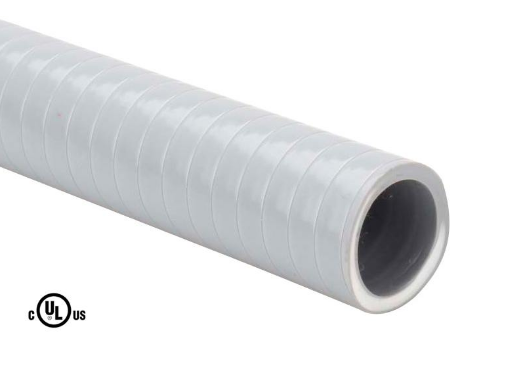Aug. 21, 2023
In the realm of electrical installations, ensuring the integrity and safety of wiring systems is paramount. Enter liquid tight non-metallic flexible conduit (LFNC), a specialized conduit designed to protect cables from various environmental factors while offering flexibility and ease of installation. This conduit type has gained widespread use in diverse applications due to its unique characteristics and benefits. In this article, we delve into the intricacies of liquid tight non-metallic flexible conduit, exploring its features, advantages, and applications in the electrical industry.
What is Liquid Tight Non-Metallic Flexible Conduit?
Liquid tight non-metallic flexible conduit, often referred to as LFNC, is a conduit system designed to encase and protect electrical cables and wiring from moisture, liquids, abrasions, and other external elements. Unlike traditional rigid metal conduits, LFNC is constructed from non-metallic materials such as PVC (polyvinyl chloride) or thermoplastic rubber, which contribute to its flexibility and liquid resistance. LFNC can be bent, twisted, and routed in various directions without compromising the integrity of the cables it encloses.
Features of Liquid Tight Non-Metallic Flexible Conduit:
1. Flexibility: The defining feature of LFNC is its flexibility. Its construction from non-metallic materials allows it to bend and conform to different angles and pathways, making it suitable for installations in tight or confined spaces.
2. Liquid Resistance: As the name suggests, LFNC is designed to resist the ingress of liquids. It provides a barrier against water, oils, chemicals, and other liquids that could potentially damage electrical cables. This liquid-tight property ensures that the cables remain protected and functional in challenging environments.
3. Corrosion Resistance: LFNC's non-metallic construction eliminates the risk of corrosion that is often associated with metal conduits. This is particularly beneficial in installations where the conduit may be exposed to corrosive substances.
4. UV Resistance: Some LFNC options are formulated with UV-resistant materials, making them suitable for outdoor installations where exposure to sunlight and weather conditions is a concern.
5. Temperature Range: LFNC materials are selected for their ability to withstand a wide temperature range, making them suitable for installations in environments with varying temperatures.
6. Easy Installation: LFNC's flexibility and lightweight nature contribute to its ease of installation. It can be easily cut to desired lengths and routed around obstacles without the need for specialized tools or equipment.

Advantages of Liquid Tight Non-Metallic Flexible Conduit:
1. Enhanced Cable Protection:
The primary advantage of LFNC is its ability to provide reliable protection for electrical cables against moisture, liquids, and physical damage. This protection extends the lifespan of cables and ensures uninterrupted power supply.
2. Versatility:
LFNC's flexibility allows it to be used in a variety of applications, from indoor installations to outdoor and even underground setups.
3. Adaptability:
Its flexibility and ease of installation make LFNC suitable for installations that require cables to navigate around obstacles, corners, and tight spaces.
4. Reduced Installation Time:
LFNC's easy installation and maneuverability contribute to reduced installation time and labor costs.
5. Low Maintenance:
Once installed, LFNC requires minimal maintenance due to its resistance to corrosion and degradation.
6. Cost-Effective:
While LFNC may have a higher upfront cost compared to traditional rigid metal conduits, its long-term benefits, including reduced maintenance and enhanced cable protection, make it a cost-effective choice.
Applications of Liquid Tight Non-Metallic Flexible Conduit:
1. Commercial and Industrial Settings:
LFNC finds extensive use in commercial and industrial environments where cables need protection against liquids, oils, and abrasions. It is often employed in machinery, equipment, and outdoor installations.
2. Outdoor Installations:
LFNC's liquid-tight and UV-resistant properties make it an excellent choice for outdoor lighting systems, security cameras, and irrigation controls.
3. Residential Installations:
LFNC is used in homes to protect wiring in areas prone to moisture, such as basements, crawl spaces, and outdoor lighting.
4. Hazardous Environments:
In environments where exposure to chemicals and liquids is prevalent, such as chemical plants or food processing facilities, LFNC offers enhanced cable protection.
Conclusion:
Liquid tight non-metallic flexible conduit stands as a versatile solution in the realm of cable protection. Its flexibility, liquid resistance, and ease of installation make it a preferred choice in a wide range of applications, from industrial settings to residential installations. By shielding electrical cables from environmental factors that could compromise their integrity, LFNC ensures reliable and safe power supply, contributing to the efficiency and longevity of electrical systems.
If you want to know more information about Liquid tight non-metallic flexible conduit, please contact us. We will provide professional answers.
Explore [The Insider's Views](https://www.conduit-flexible.com/products/).















